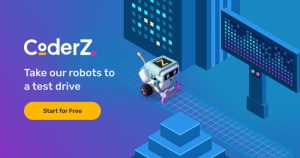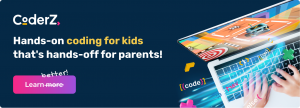
Is Your Kid Ready to Learn Coding?
March 20, 2022Today’s kids are all “digital natives.” A digital native simply means someone born during the information age who can quickly and easily consume digital information through computers, mobile phones, and social media. No one is entirely sure how growing up with these digital tools will affect kids into the future, but we do know that code-based technologies will have an even greater impact during their lifetimes.
Some technologies, such as the metaverse and Augmented Reality, are already blurring the boundaries between what’s real and virtual. Researchers in comparative media call this “The Transparency Problem,” which is “the challenges young people face in learning to see clearly the ways that media shape perceptions of the world.” Fortunately, figuring out how these technologies work can set kids up to use them a lot more consciously and creatively. Even kids who don’t want to become programmers can benefit from understanding the basics!
Is my kid old enough to start learning code?
No single answer exists to the question of when kids should start learning to code. A more relevant question is what are the most suitable coding tools to match their personal readiness. For example, some kids will feel more comfortable learning to code after they can read and write. Others will find that learning to code early on helps them gain confidence in additional areas of learning.
 You can choose coding tools according to your kids’ needs and preferences. For pre-readers that could include books or board games. For early elementary school ages, simple block-based programming is a great option – especially if it integrates STEM development. Older kids with strong reading and writing skills and a solid STEM foundation can find programming languages that develop their specific interests, whether it’s designing a game or building career skills for the future.
You can choose coding tools according to your kids’ needs and preferences. For pre-readers that could include books or board games. For early elementary school ages, simple block-based programming is a great option – especially if it integrates STEM development. Older kids with strong reading and writing skills and a solid STEM foundation can find programming languages that develop their specific interests, whether it’s designing a game or building career skills for the future.
Though the details range in complexity, the basic idea remains the same and can be adapted to the cognitive and emotional abilities of any age. The key to a rewarding code-learning experience is simply meeting kids at their level while creating opportunities to embrace failure and encouraging curiosity. So when you look for coding tools or coding classes for kids, make sure these are built-in.
How kids can apply coding to daily life
Informed interaction with technology is a worthwhile goal in its own right, but there’s a lot more that learning to code can offer kids. For example, coding develops important 21 Century skills such as critical thinking and problem-solving.
Good code requires mental flexibility, the questioning of assumptions, and looking beyond our own needs to build something that can serve multiple and often competing demands. It’s easy to see how this could come in handy with siblings! What parent couldn’t appreciate that?
Coding also utilizes a framework for identifying, analyzing, and describing problems, as well as testing and measuring solutions. It offers a clear, repeatable way for kids to put this problem-solving framework into practice and apply it in real life.
Basic building blocks: the ‘big 5 coding concepts’
Below are five of the core concepts in coding that are shared across all programming languages. This is how we translate our ideas into actions so computers can implement them.
- Algorithms: Algorithms are sets of rules that follow step-by-step processes to carry out a specified operation. For example, they can be used to search or sort data on a computer.
- Variables: Variables let us save information that we need so we can access it
 repeatedly. They help computers plug in specific details to complete actions, such as logging in with a name and password.
repeatedly. They help computers plug in specific details to complete actions, such as logging in with a name and password. - Conditional Statements: Are you familiar with the acronym IFTTT? It stands for If This Then That. This is how conditional statements work. They allow computers to perform certain actions depending on a condition.
- Loops: Loops are used to repeat the same block of code when you need to perform the same action to multiple items, such as with a list of names.
- Functions: Functions are blocks of code that implement actions based on specific data. Think of the contacts in your phone. Once you define your function (the list of names), you can use it to implement actions (call a selected contact).
Kid- and parent-friendly coding tools
CoderZ at Home is an online platform for home learning that offers award-winning coding classes for kids. The scaffolded lessons stack new concepts on existing knowledge so that learning is fun, not frustrating. No prior experience is needed and kids can self-pace their way through course material that feels like a game, using bite-sized missions and 3D robots to bring coding to life.
Designed to be hands-on for kids and hands-off for parents, a CoderZ at Home subscription includes a dedicated parent account so you can monitor kids’ progress without standing over their shoulders. And if you prefer to lead the learning you get access to a ton of resources including guides, walkthroughs, webinars, and more.
The courses are organized by learning level and include three gamified coding worlds for kids to explore.
- Codyssey World is designed for novice learners, ages 8-11. It introduces kids to coding and robotics, while practicing basic concepts in STEM.
- Codabunga World is designed for beginners, ages 9-12. It builds a strong STEM foundation on which kids can develop coding skills from the ground up.
- Robo Rover is an intermediate-level course for ages 11-15 that introduces kids to more complex concepts in coding and robotics.
Excited to start? Take a free test run of Coderz at Home today, or sign up with a single monthly subscription for access to their entire range of coding classes for kids!
Additional Homeschool Resources
5 Ways Coding Encourages Logical Thinking
Computer Science Explore STEM Careers
Latest Posts

While nearly every college and university today is eager to accept homeschooled students into their institutions, homeschooling families need to understand that their student’s application…
Read more >
Guest Post by Gabriel Morse For several years, I sat for long hours every day behind one of those battleship gray desks in a windowless, dull, gray office. The pay was enough to take care…
Read more >
This post is sponsored by Little Monsters Universe. I'm Tina Salmanowitz, an advocate for homeschooling and science education. With over a decade of experience as a science educator (in class…
Read more >

